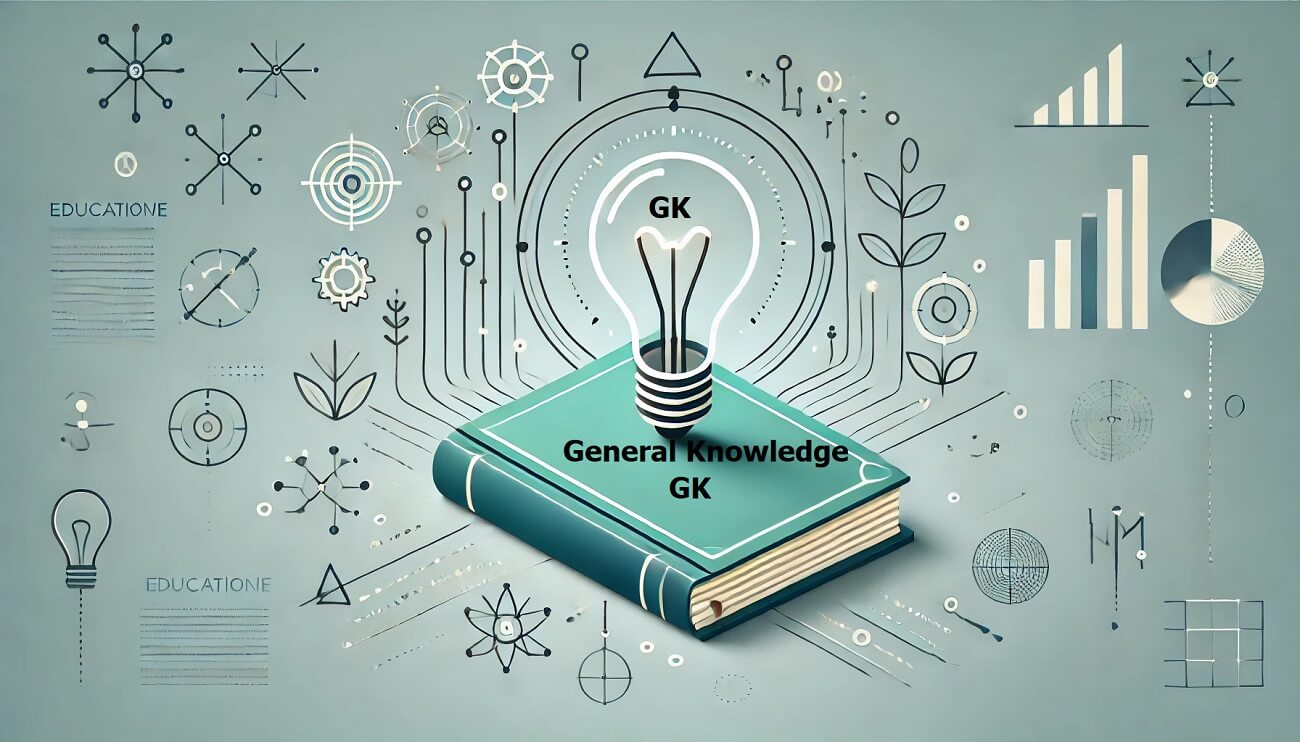
Why Is GK Important for Students?
Have you ever been amazed by a student who confidently answers questions, participates in discussions, or understands the world beyond textbooks? The secret to such confidence is often a strong foundation in general knowledge (GK). It's more than just trivia—it's about developing an informed perspective on the world and its workings.
For students, general knowledge isn't just about passing exams; it's about becoming capable individuals better prepared to tackle life's challenges.
In this article, we'll explore why general knowledge is essential for students, its benefits, the challenges of acquiring it, and actionable strategies for improving it.
Understanding General Knowledge (GK)
General knowledge refers to awareness of various subjects, such as history, science, current events, culture, and geography. It goes beyond specialized knowledge tied to a specific field and gives students a broader world understanding.
Unlike niche academic knowledge, general knowledge:
-
It helps students connect ideas across disciplines.
-
Encourages curiosity and lifelong learning.
-
Equips them with the skills to adapt to changing environments.
A National Center for Education Statistics study revealed that students who actively learn general knowledge perform 20% better in problem-solving tasks than their peers.
The Role of General Knowledge in Student Development
Cognitive Development
General knowledge sharpens cognitive abilities by improving memory, analytical thinking, and comprehension. It helps students form connections between seemingly unrelated topics, encouraging deeper learning.
Exploring the historical background of the Industrial Revolution helps students understand modern technological progress. It illustrates the gradual development of innovation over time.
Academic Performance
A strong base in GK supports academic performance by providing context and enhancing subject understanding. Subjects like history, geography, and science are highly beneficial when students have a wider pool of knowledge from which to draw.
A 2019 report by Educational Psychology Today found that students with high general knowledge scored 15% higher in subjects requiring analytical reasoning and comprehension.
Social Engagement
Students with diverse knowledge feel more confident in discussions, debates, and group activities. General knowledge fosters cultural awareness, empathy, and the ability to navigate social interactions effectively.
I remember a debate competition where my knowledge about climate change, gained from reading global reports, helped me confidently argue my points. That experience boosted my confidence and inspired others to explore the topic further.
Benefits of GK for Students
Enhances Critical Thinking

General knowledge acts as a powerful catalyst for developing critical thinking skills. When exposed to diverse ideas, perspectives, and information, students learn to analyze situations more effectively, evaluate evidence, and arrive at logical conclusions. This skill is not just academic—it's a life skill that helps students navigate complex decisions in everyday situations. For instance, understanding the environmental impact of fossil fuels enables students to think critically about sustainable energy solutions.
A high school student passionate about climate change kept up with articles and news on renewable energy. Armed with well-researched data, they presented a compelling case to their school council, successfully advocating for installing solar panels on campus. This reduced the school's carbon footprint and inspired peers to think about the broader impact of their choices.
Prepares for Competitive Exams
General knowledge is a core component of many competitive exams, from university entrance tests like the SAT to specialized quizzes and aptitude tests. A broad understanding of current events, history, and science helps students approach such exams confidently. Unlike rote memorization, general knowledge fosters understanding, improving accuracy and reducing exam stress.
Cultivating the habit of staying informed daily—whether through newspapers, apps, or educational videos—can make preparation seamless and prevent last-minute cramming. Over time, this habit builds a reservoir of knowledge that students can effortlessly tap into.
Fosters Lifelong Learning
General knowledge fosters curiosity and inspires a passion for learning, motivating students to venture beyond the boundaries of their regular curriculum. By staying informed about global events, cultural practices, and scientific advancements, students remain adaptable and open to new ideas.
"Lifelong learning starts with asking 'why?' and 'how?' General knowledge is the key that opens the door to answers," says Dr. Emily Carter, an education consultant.
This broader perspective not only equips students to adapt to changing environments but also helps them become informed, empathetic individuals capable of making meaningful contributions to society. General knowledge is not just about accumulating facts—it's about learning how to think, grow, and engage with the world more profoundly.
Strategies to Improve General Knowledge
1. Develop Reading Habits

Reading is a time-tested method for building and improving general knowledge. Newspapers, magazines, and books offer a wealth of information on diverse subjects and viewpoints, exposing readers to global events, history, culture, and science. These resources provide facts and help students develop a broader perspective on issues.
Dedicate 15–20 minutes daily to reading a newspaper, following a news app, or exploring online articles. For students interested in specific topics, picking up books or magazines focused on those subjects can make the process enjoyable and engaging.
A student who regularly reads articles on global environmental challenges might become knowledgeable enough to participate in discussions, write essays, or propose solutions in their community.
2. Leverage Educational Tools and Resources
Modern technology has transformed the way students access and learn general knowledge. Interactive platforms like Quizlet, Khan Academy, and dedicated YouTube channels simplify complex topics, making learning engaging and effective.
A 2022 survey by Learning Tools Weekly revealed that students using interactive quiz apps improved their recall ability during exams by 30%. These tools significantly benefit students who prefer visual or interactive learning methods.
Explore apps and websites that specialize in general awareness. For instance, download an app that provides daily quizzes or short videos summarizing essential events.
3. Participate in Discussions and Debates
Engaging in discussions and debates is a powerful way to expand general knowledge. These activities encourage students to articulate their opinions, learn from others, and consider diverse perspectives.
Joining my school's debate team introduced me to viewpoints I hadn't considered before. For instance, debating climate change with my peers deepened my understanding of environmental policies and their real-world implications. This enhanced my knowledge and improved my confidence and critical thinking skills.
To stay updated and learn collaboratively, join school clubs, participate in online forums, or attend local discussion groups.
Challenges in Acquiring General Knowledge
1. Information Overload
The internet offers abundant information, but this can be overwhelming for students trying to determine what's credible and relevant.
Focus on trusted and reliable sources. Verified news outlets, peer-reviewed articles, and educational platforms are excellent starting points. Avoid random blogs or unverified websites that may spread misinformation.
2. Lack of Access to Resources
Not all students have equal access to the resources required to build general knowledge. Library, internet connectivity, and educational tools can be limited in underprivileged areas.
A 2020 UNESCO report revealed that 35% of students in low-income countries lack access to quality learning materials. This highlights the need for resource-sharing initiatives like mobile libraries, free educational apps, and community learning centers.
Teachers, schools, and communities can work together to create accessible learning environments. Sharing books, hosting workshops, or providing group access to online platforms can bridge these gaps.
Real-Life Applications of General Knowledge
1. Career Success
General knowledge equips students with a broader understanding of their field and beyond, making them more adaptable in professional settings. Employers often value candidates who stay informed about industry trends and global events. For instance, knowledge of current economic trends can help during interviews for finance-related roles.
A student applying for an internship at a tech company impressed the interview panel by discussing recent advancements in artificial intelligence, showcasing a proactive approach to staying informed.
2. Social Responsibility
A well-informed individual can make meaningful contributions to society. General knowledge helps students understand societal challenges and develop solutions that benefit their community.
A group of students who understood the science behind recycling started an eco-club in their school. They educated peers about waste management and implemented programs like composting and recycling bins, making a tangible difference in their school's environmental impact.
Participate in community projects or volunteer for causes you're passionate about. Use your general knowledge to educate others and inspire positive change.
Conclusion
General knowledge is a cornerstone of a student's personal and academic growth. It sharpens their minds, enriches their perspectives, and prepares them for life's challenges. Students achieve academic success and grow into informed, responsible individuals by cultivating the habit of learning and staying informed.
The journey to acquiring general knowledge starts small. Begin by exploring topics you're curious about, reading daily, engaging in meaningful conversations, and embracing learning opportunities. Over time, you'll see how it transforms your confidence, understanding, and ability to navigate the world.
Frequently Asked Questions (FAQs)
Q1: What is general knowledge, and why is it important for students?
General knowledge is awareness across various subjects, helping students excel academically, think critically, and engage socially.
Q2: How can students improve their general knowledge daily?
Reading newspapers, using educational apps, and participating in discussions effectively enhance GK.
Q3: What are the benefits of general knowledge in career building?
General knowledge improves adaptability, communication skills, and awareness of global trends, making students more competitive in the job market.
Q4: Why is general knowledge essential for competitive exams?
Many exams include GK sections that test reasoning and awareness, making it a crucial skill for success.
Q5: What resources are best for enhancing general knowledge?
Reliable resources include apps like Quizlet, online platforms like Khan Academy, and trusted news outlets.
Learning Skills




